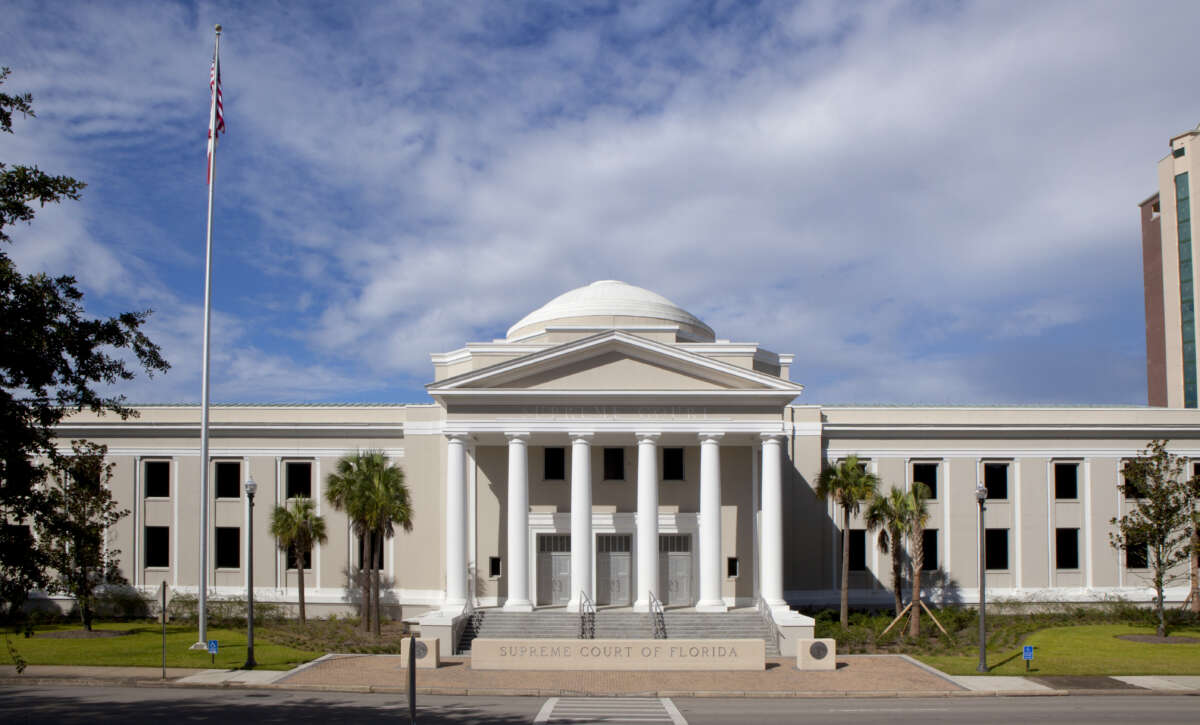Florida Supreme Court justice Charles Canady refused to recuse himself from hearing arguments last Friday in a lawsuit that could trigger a six-week abortion ban in the state — despite the fact that his wife, state Rep. Jennifer Canady (R), is a co-sponsor of the ban.
“I cannot imagine himself not recusing himself from a bill that his wife co-sponsored,” Barbara Pariente, a former chief justice of the Florida Supreme Court, said in June.
Since Roe v. Wade was overturned last summer, Florida has allowed people to access abortion up to 15 weeks of pregnancy, making the state a major hub for people seeking abortion care in the South. In April, Gov. Ron DeSantis (R) signed a bill into law that would ban abortion in the state after six weeks of pregnancy. If the state Supreme Court upholds the 15-week ban in the case in which Justice Canady is participating, the decision will automatically trigger the six-week ban.
“If he really wants this decision to have integrity,” said Bob Jarvis, a law professor at Nova Southeastern University, “you would think that he would have recused himself from day one.”
Prior to being appointed to the state Supreme Court, Canady was a state House representative. During his tenure, he sponsored multiple bills to restrict abortion care in Florida.
“I think that after working for so long on anti-abortion issues, that the idea that at the moment when it’s going to happen, he won’t be there — it’s just something that he cannot abide,” Jarvis said.
Canady isn’t the only judge who has personal ties to the anti-abortion movement. Florida Supreme Court Justice Carlos Muñiz has been described by the anti-abortion group Florida Family Action as being a supporter of a crisis pregnancy center (a facility that attempts to dissuade people from having abortions) in Tallahassee.
“Abortion has been a recognized right in Florida for decades,” said Whitney White, an ACLU staff attorney. “There’s no basis in the text to exclude a decision so personal and so private as whether to continue a pregnancy.”
During oral arguments on Friday, Muniz suggested that legal abortion violated fetal personhood and asked if the federal Supreme Court’s invalidation of the Roe standard in the 2022 Dobbs ruling had any impact on the Florida case.
“Should we take that into account? Should it matter to us that the entire foundation of the asserted right here that the (U.S.) Supreme Court has now said was egregiously wrong?” Muniz asked White.
“Nothing in the Dobbs decision displaces state protections for abortion that were more protective than federal law,” she replied. “States are free to afford that level of protection. That’s precisely what Floridians have done here.”
Another state Supreme Court justice, Jamie Grosshans, has connections to the Christian legal organization Alliance Defending Freedom, the group currently suing the Food and Drug Administration (FDA) in an attempt to ban the abortion pill, mifepristone.
Five of the seven justices on the Florida Supreme Court were appointed by DeSantis, and all of the DeSantis appointees are part of the conservative Federalist Society. If the 15-week ban is upheld and the six-week ban is triggered, abortion access in the Southern United States will be effectively wiped out.
However, abortion rights advocates in Florida are hopeful that they may be able to win back abortion rights via a referendum on the state’s 2024 ballot. The abortion rights group Floridians Protecting Freedom says that it has collected nearly three-quarters of the 900,000 verified signatures required for the ballot initiative. If the ballot initiative succeeds, the right to an abortion would likely be enshrined in the state constitution.
“Our grassroots momentum continues to build — even through the heat of the summer — as evidenced by these latest petition and fundraising totals,” said Lauren Brenzel, campaign director of Floridians Protecting Freedom.
Our most important fundraising appeal of the year
December is the most critical time of year for Truthout, because our nonprofit news is funded almost entirely by individual donations from readers like you. So before you navigate away, we ask that you take just a second to support Truthout with a tax-deductible donation.
This year is a little different. We are up against a far-reaching, wide-scale attack on press freedom coming from the Trump administration. 2025 was a year of frightening censorship, news industry corporate consolidation, and worsening financial conditions for progressive nonprofits across the board.
We can only resist Trump’s agenda by cultivating a strong base of support. The right-wing mediasphere is funded comfortably by billionaire owners and venture capitalist philanthropists. At Truthout, we have you.
We’ve set an ambitious target for our year-end campaign — a goal of $250,000 to keep up our fight against authoritarianism in 2026. Please take a meaningful action in this fight: make a one-time or monthly donation to Truthout before December 31. If you have the means, please dig deep.
